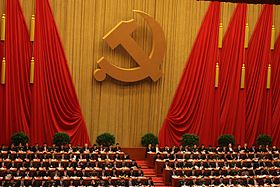
Back حملة مكافحة الفساد في عهد شي جين بينغ Arabic Antikorruptionskampagne unter Xi Jinping German Kampanye antikorupsi di Tiongkok ID 반부패 운동 Korean Campanha anticorrupção de Xi Jinping Portuguese Chiến dịch đả hổ diệt ruồi Vietnamese 中共十八大后的反腐败 Chinese 王岐山反貪 ZH-YUE
You can help expand this article with text translated from the corresponding article in Chinese. (March 2023) Click [show] for important translation instructions.
|

| History of the People's Republic of China |
|---|
 |
| History of |
|
|
 |
|---|
|
|
A far-reaching anti-corruption campaign began in China following the conclusion of the 18th National Congress of the Chinese Communist Party (CCP) in 2012. The campaign, carried out under the aegis of Xi Jinping, General Secretary of the Chinese Communist Party, was the largest organized anti-corruption effort in the history of CCP rule in China.
Upon taking office, Xi vowed to crack down on "tigers and flies", that is, high-level officials and local civil servants alike. Most of the officials investigated were removed from office and faced accusations of bribery and abuse of power, although the range of alleged abuses varied widely. The campaign 'netted' over 120 high-ranking officials, including about a dozen high-ranking military officers, several senior executives of state-owned companies, and five national leaders.[1][2] As of 2023, approximately 2.3 million government officials have been prosecuted.[3]: 129 The campaign is part of a much wider drive to clean up malfeasance within party ranks and shore up party unity. It has become an emblematic feature of Xi Jinping's political brand.
We should continue to catch "tigers" as well as "flies" when dealing with cases of leading officials in violation of Party discipline and state laws as well as misconduct and corruption problems that directly affect the people's interests. All are equal before the law and Party discipline; whoever is involved in a corruption case must be thoroughly and impartially investigated.
— Xi Jinping, "Power Must Be "Caged" by the System", Qiushi January 22, 2013, [4]
Executed largely under the direction of the Central Commission for Discipline Inspection (CCDI) and its Secretary from 2012 to 2017 Wang Qishan along with corresponding military and judicial organs, the campaign was notable in implicating both incumbent and former national-level leaders, including former Politburo Standing Committee (PSC) member Zhou Yongkang and former Central Military Commission (CMC) vice-chairmen Xu Caihou and Guo Boxiong. Such investigations broke the unspoken rule regarding 'PSC criminal immunity' (Chinese: 刑不上常委) that has been the norm since the end of the Cultural Revolution.[5]
- ^ "Can Xi Jinping's Anti Corruption Campaign Succeed?". Chinapower Project. ChinaPowerCSIS. 2016-06-13. Archived from the original on 2017-06-22. Retrieved 2017-05-31.
- ^ 第99"虎"落马警示了啥? (in Chinese). March 21, 2015. Archived from the original on April 16, 2015.
- ^ Jin, Keyu (2023). The New China Playbook: Beyond Socialism and Capitalism. New York: Viking. ISBN 978-1-9848-7828-1.
- ^ "Qiushi Journal". Qiushi. Retrieved 19 January 2024.
- ^ Ma, Haoliang. "Which PSC members are no longer called "Comrades"?". Ta Kung Pao. Archived from the original on 2015-03-02. Retrieved 2015-03-12.
© MMXXIII Rich X Search. We shall prevail. All rights reserved. Rich X Search